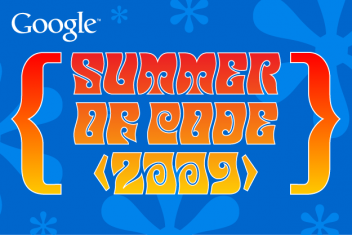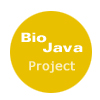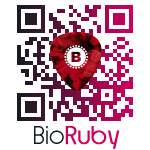| Please visit our ***NEW*** OBF/BOSC website: https://www.open-bio.org/ |
-
Difference between revisions of "Google Summer of Code"
(→Open-Bio Projects Accepting Applicants) |
(→Mentor List) |
||
| Line 65: | Line 65: | ||
* [[bp:User:Cjfields|Chris Fields]] (U. Illinois at Urbana-Champaign; BioPerl) | * [[bp:User:Cjfields|Chris Fields]] (U. Illinois at Urbana-Champaign; BioPerl) | ||
* [[bp:User:Majensen|Mark Jensen]] (Fortinbras; BioPerl) | * [[bp:User:Majensen|Mark Jensen]] (Fortinbras; BioPerl) | ||
| + | * [http://biojava.org/wiki/User:Andreas Andreas Prlic] (UCSD; [http://biojava.org/wiki/Google_Summer_of_Code BioJava]) | ||
== What should prospective students know? == | == What should prospective students know? == | ||
Revision as of 12:53, 5 March 2010
Once again in 2010, the OBF is applying to the Google Summer of Code (GSoC) program as an umbrella organization for all OBF-affiliated projects.
This page serves as a collection point for ideas, projects, prerequisites, solution approaches, mentors, other people or channels to contact for more information.
Contents
About Google Summer of Code
For those not familiar with theprogram, Google Summer of Code (GSoC) is maybe best described as a remote student internship program for globally distributed, collaboratively developed open-source projects. The program offers eligible student developers stipends to write code for open source projects over a period of 3 summer months ("flip bits, not burgers"). Aside from the stipend, perhaps the most important qualitative difference of this program is that students are paired with mentors, who are typically experienced developers from the project to which the student would be contributing, and who can guide the student to interact productively with the community, prevent getting stuck in obstacles, and avoid chasing down the wrong direction. The program is global - students and mentors may be located anywhere where they have internet connection ([http://socghop.appspot.com/document/show/program/google/gsoc2009/faqs#not_eligible except for countries affected by US trade restrictions]), and no travel is required. Thus, other than the stipend and the mentorship, the internship mirrors normal contributors to such distributed development projects, which is a useful learning experience in itself, as the skills needed to be effective at this are typically not taught in computer science curricula, yet are highly desired in an increasingly global IT industry.
From the viewpoint of participating open-source projects, the program not only offers to pay students for contributing, but more importantly offers an opportunity to recruit new developers in a way that allows far more people to leap over the barrier from interested user to code contributor.
See [http://socghop.appspot.com/document/show/program/google/gsoc2009/faqs#about_gsoc the GSoC FAQs and documentation] for further information, and see below for reference facts such as eligibility and timelines.
Contact
Our organization administrators are primary administrator Robert Buels (rmb32@cornell.edu) and backup administrator Hilmar Lapp (hlapp@gmx.net).
If you are a student interested in applying for a Google Summer of Code project with our organization, please send questions and project ideas to the develop mailing list of the pertinent OBF project.
How do you know which project is pertinent and the address of its developer mailing list? The projects under the OBF umbrella are listed below, with home page and developer mailing lists. Each project idea lists the OBF project it is a part of; look it up in the list below and you have the information you need. If you want to propose your own project idea and the project to which you would contribute isn't obvious, send email to gsoc@lists.open-bio.org. However, do not worry overly much about picking the right OBF project at the outset. If you are unsure, simply make your best guess, and other members of the email list will help you to find the best organization to suit your idea.
Some of us also can regularly be found on IRC, see the list of OBF projects below for information on which projects have a channel and the name of the channel. (If you do not have an IRC client installed, you might find the comparison on Wikipedia, the Google directory, or the IRC Reviews helpful. For Macs, X-Chat Aqua works pretty well. If you have never used IRC, try the IRC Primer at IRC Help, which also has links to lots of other material.)
For applying, please make sure you read our documentation on information that students should know and guidelines we expect you to follow before you apply. We don't have a format template for application that you need to adhere to, but we do ask that you include specific kinds of information. What those are is documented under "When you apply."
Ideas
Note: primary project mentors are in bold font. Biographical and other information on the mentors is linked to in the Mentors section.
Students: The project ideas below are suggested projects from mentors, albeit well thought-out ones. You are welcome to propose your own project if none of those below catches your interest, or if your idea is more exciting to you, provided it is still a contribution to one the OBF member projects (see list below). Just be aware that we can't guarantee finding an appropriate mentor, but if we like your proposal we will try. Regardless of what you decide to do, make sure you read and follow the guidelines for students below.
Mentor List
- Chris Fields (U. Illinois at Urbana-Champaign; BioPerl)
- Mark Jensen (Fortinbras; BioPerl)
- Andreas Prlic (UCSD; BioJava)
What should prospective students know?
Before you apply
- If you want to apply with your own idea, determine which OBF project you would be contributing to, and contact us early on so we can try to find a mentor.
- Proposals should extend one of affiliated toolkits.
- Ask us questions about the project idea you have in mind.
- Write a project proposal draft, include a project plan (see below), and bounce those off of us.
Again, students are strongly encouraged to contact us before applying. Frequent and early communication is extremely valuable for putting together successful projects.
When you apply
When applying, (aside from the information requested by Google) please provide the following in your application material.
- Why you are interested in the project you are proposing and are well-suited to undertake it.
- A summary of your programming experience and skills.
- Programs or projects you have previously authored or contributed to, in particular those available as open-source, including, if applicable, any past Summer of Code involvement.
- A project plan for the project you are proposing, even if your proposed project is directly based on one of the ideas above.
- A project plan in principle divides up the whole project into a series of manageable milestones and timelines that, when all accomplished, logically lead to the end goal(s) of the project. Put in another way, a project plan explains what you expect you will need to be doing, and what you expect you need to have accomplished, at which time, so that at the end you reach the goals of the project.
- Do not take this part lightly. A compelling plan takes a significant amount of work. Empirically, applications with no or a hastily composed project plan have not been competitive, and a more thorough project plan can easily make an applicant outcompete another with more advanced skills.
- A good plan will require you to thoroughly think about the project itself and how one might want to go about the work.
- We don't expect you to have all the experience, background, and knowledge to come up with the final, real work plan on your own at the time you apply. We do expect your plan to demonstrate, however, that you have made the effort and thoroughly dissected the goals into tasks and successive accomplishments that make sense.
- We strongly recommend that you bounce your proposed project and your project plan draft off of us, using either the pertinent developers mailing list or the IRC channel(s). Through the project plan exercise you will inevitably discover that you are missing a lot of the pieces - we are there to help you fill those in as best as we can.
- Any obligations or plans for the summer during the coding period that may possibly conflict.
- We expect the your GSoC projec to be your primary focus over the summer. It should not be regarded as a part-time occupation.
- If you feel that you can manage other work obligations concurrently with your Summer of Code project, make your case and support it with evidence.
- Be honest and open. If it turns out later that you weren't clear about other obligations, at best (i.e., if your accomplishment record at that point is spotless) our trust in you will be severely degraded. Also, if you are accepted, discuss with your GSoC mentor before taking on additional obligations.
- One of the most common reasons for students to struggle or fail is being overcommitted. Do not set yourself up for failure! GSoC summers should be fun and rewarding!
Other information
- Our 2009 application document with Google's questions and our answers.
- For questions of eligibility, see the GSoC eligibility requirements for students. These requirements must be met on April 20, 2009.
- There is also a Google group for posting GSoC questions (and receiving answers; note that you will need to sign up for the group) that relate to the program itself (and are not specific to our organization).
- Students receive a stipend from Google if accepted. See the Google SoC FAQ on payments for full documentation.
Open-Bio Projects Accepting Applicants
- BioPerl
-
- Project website
- Information for new developers
- source code browser for bioperl-live (the main BioPerl code base), and all BioPerl sub-projects
- Priority list of things that need work, as another source for student-conceived project ideas
- Mailing lists
- IRC: #bioperl on Freenode
- BioJava
-
- BioJava GOSC
- BioJava modules as another source for student-conceived project ideas
- source code for biojava-live (the main BioJava code base) and all BioJava sub-projects
- Mailing lists
- No IRC channel at present
- Biopython
-
- Project website
- Information for contributors
- Mailing lists
- Source Code
- No IRC channel at present
- BioRuby
-
- Project website
- developers mailing list
- source code
- No IRC channel at present
- BioSQL
-
- Project website
- Current enhancement requests as another source for student-conceived project ideas
- developers mailing list
- source code
- No IRC channel at present
- BioLib
-
- Project website
- developers mailing list
- source code
- No IRC channel at present
Reference Facts & Links: Google Summer of Code 2010
- Mentoring organizations apply between March 9-13, 2009. Accepted mentoring organizations will be published March 18. See full set of timelines.
- Google expects to accept around 150 mentoring organizations, a bit less than in 2008 (when they accepted 175). If the trend over the past years is any indication, this will be out of at least 3x as many organizations that apply.
- Students apply between March 23-April 3, 2009. The eligibility requirements for students are in the GSoC FAQ.
- Development occurs on-line, there is no requirement or expectation to travel, neither for students nor for mentors.






